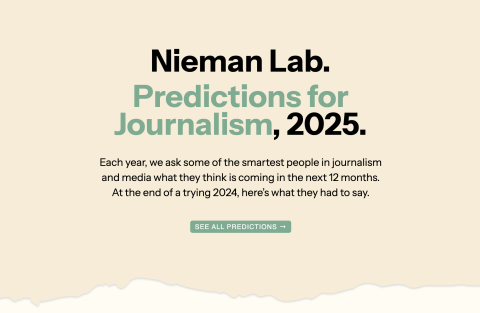
This article was first published by Nieman Lab.
You don’t have to look further than the recent U.S. elections to see why journalism will evolve in 2025 — and why it must. Candidates bypassed traditional news media in favor of podcasters and social media influencers, an approach strategists say helped Trump’s campaign appeal to young men and secure his victory. More than half of men under 30 supported him.
The significance of content creators on politics isn’t new, but it’s growing — and we saw that extend far beyond the U.S. in elections across the world this year (take El Salvador or India). The trend illustrates just how much our civic information ecosystem has transformed since the days when candidates courted newspaper endorsements. Whether you hate it or welcome it, the news media have to recognize it and adapt to remain relevant.
In 2025, that means getting outside our lane and taking bold action.
This year, I hope to see more news media pursue innovative, meaningful collaboration with the multitude of stakeholders who today make up the civic information space…the technologists, citizen journalists, researchers, civil society, and yes, content creators who value accuracy, fairness, and transparency. We need to seek out these journalist-adjacent actors who share the same goal as many newsrooms of delivering actionable, trustworthy news and information to people — information that the public can use to make sense of the world and improve their lives and their societies. They just bring different tools and expertise to do it.
And that’s needed. Breaking through the information overload that we all experience today has to be front and center for journalism to be relevant and impactful. Cross-functional collaboration among stakeholders in the civic space creates a powerful path for getting there.
One example: In 2025, journalists in East Africa will come together with civil society actors and technologists to collaborate on investigative journalism in the public interest. They’ll work through a new investigative hub for transnational collaborative journalism that my organization, the International Center for Journalists, is creating with Code for Africa, a media-focused civic technology organization.
Through this partnership, media organizations, civil society actors, and others will have access to partnerships and a diverse portfolio of cutting-edge forensic and AI tools, in addition to training and reporting grants. The end goal is to scale the reach and impact of public interest investigative journalism. At a time when threats against democracy are growing, collaborations like this also enable us to learn from each other and defend against attacks.
Together, we can unleash innovation that would be impossible on our own. We can break through the information overload that so many people experience today to deliver relevant, useful information that matters in their lives. And that is what journalism is all about.
Read other predictions for the future of journalism.